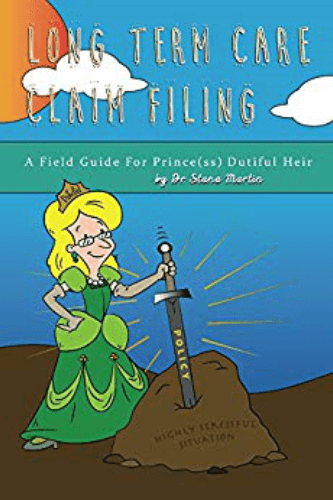Probably. Or…uh…maybe.
The reason we can’t answer that with an absolute “yes” or “no” is because it depends on answers to a couple of questions:
1) Type of Care:
every contract will specify what types of care it will pay for. Some may pay for home care only, or skilled nursing home only, or have this vague statement of “facility only” – but you aren’t sure if that means assisted living or not. More modern policies tend to be “comprehensive”, meaning they pay for every type of care. And finally some policies pay cash (indemnity) so you can have what ever care giver you want, while others require a licensed care provider.
The only way to really answer this question is to read the contract carefully to know what type of care provider is approved in the contract and how that care provider is defined in the glossary section.
2) Medical eligibility:
every contract also specifies the criteria to be medically eligible. If your contract was bought before 1996, definitely read the contract. The details of medical eligibility are buried in there somewhere and there was no standardization prior to the law passed in 1996 that created tax-qualified policies. If it was bought after 1996, chances are it is a tax-qualified policy (though once in a while we see ones that are not….).
READ HERE about tax qualified policies
If it is tax-qualified, then it will follow the federal language for that type of policy. To be medically eligible you will have to be able provide documentation (this means doctor’s records, plan of care from home care or assisted living, and more…). that states you have medical need of help for EITHER
a. 2 of 6 Activities of daily living (we lovingly call this the “neck down” problem of care).
These are:
i. bathing,
ii. dressing,
iii. incontinence of bowel or bladder and needing help with personal hygiene,
iv. toileting – including getting on/off the toilet and help with personal hygiene.
v. Transferring to/from a bed or chair
vi. Eating – this means lifting a fork from a plate if food is already prepared and set in front of you.
OR…
b. you require supervision because you have severe enough dementia that, if left unsupervised, you could be a danger to yourself or others.
Lastly, you have to be chronically ill, which means there is every expectation that you will need this level of care for 90 days or more.
In short, you have two hurdles to clear to be claim eligible: you must have a care provider that is approved in the contract, and you must meet the medical need for care as outlined in the contract.
If either of these is not cleared, the claim will be denied and no benefit will pay.
If you are considering filing a claim, we highly recommend that you read the inexpensive book that gives you all the insider tips on how to file a claim successfully ,
Or that you set up a time to speak with one of our long term care insurance specialists. The first half hour conversation is at no charge. CLICK HERE TO SCHEDULE APPOINTMENT
Questions?
Contact - Mrs. LTC
Long Term Care Claims & Insurance
Question about a Claim?
Shopping for coverage?









Leave A Comment
You must be logged in to post a comment.